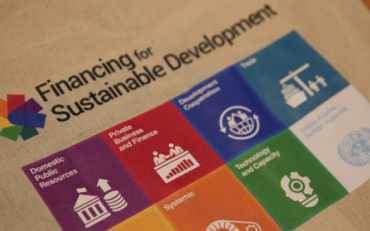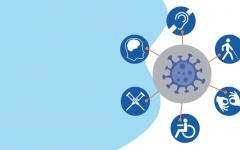Financing for development (FfD) is a complex subject; it navigates economies of various sizes and the differing priorities of governments, NGOs, and UN systems. This year, the FfD Forum will take place from the 12th to the 15th of April. The Forum is an inter-governmental process mandated to review the Addis Ababa Action Agenda, other financing for development outcomes, and the implementation of the Sustainable Development Goals (SDGs).
The focus of this year’s FfD Forum is “an inclusive platform to advance an action-oriented dialogue on the solutions on financing the COVID-19 recovery and sustainable development on the path to 2030.”[1] The Covid-19 pandemic has disproportionately and negatively affected persons with disabilities. The FfD process is important and unique as it is open-ended, unlike the 2030 Agenda that ends in 2030. Moreover, the Forum is not purely a UN meeting, but also includes non-UN entities, including the Bretton Woods institutions, WTO and UNCTAD, indicating a shared space for collaboration with UN and non-UN organizations and institutions. It is essential that FfD safeguards the economic inclusion and human rights of persons with disabilities by reaching those furthest behind.
It is important to note in this moment of rebuilding from the pandemic that we have come a long way. The Millennium Development Goals had zero references for persons with disabilities. This exclusion had many negative consequences, with frameworks and programs to achieve the MDGs not addressing issues faced by persons with disabilities. This gap was closed by advocacy efforts of the disability movement and allies toward the adoption of the 2030 Agenda, throughout which persons with disabilities are meaningfully referenced.
The Addis Ababa Action Agenda is the outcome document from the Third Conference on Financing for Development that took place in July 2015. Its main goal is to “achieve sustainable development in its three dimensions through promoting inclusive economic growth, protecting the environment, and promoting social inclusion.”[2] The Addis Agenda includes six references to persons with disabilities covering a variety of areas including social protection and public services, quality education, employment, technology and innovation, and data collection. In addition, it also includes several references to inclusion, access, and accessibility.
Ensuring persons with disabilities are included in financing for development processes and dialogues is critical to guarantee that resources are allocated for inclusion. The recently published draft 2021 Financing for Sustainable Development Report (FSDR) has included a number of references to persons with disabilities. Quite positively, disability is included in the introduction section, highlighting the importance of investing in people, including persons with disabilities. Disability and persons with disabilities are referenced eight times throughout the report most strongly in the area of sustainable finance and development and disability data. The Stakeholder Group of Persons with Disabilities has written an analysis of the draft, reflecting on the positive references as well as the ways it could more strongly safeguard the rights of persons with disabilities in development financing.
The empowerment of women is certainly important and should always be considered, and the 2021 FSDR references women and girls over 100 times. Many of those women and girls referenced are persons with disabilities too, but that specific aspect of their lived experiences is invisible. There is room at the table for including persons with disabilities, in all the diverse intersections they bring. Sustainable development requires the commitments of time, energy, and funding. Governments should take a rights-based approach, including the rights of persons with disabilities, to ensure the rights of all are reflected in financial and economic policies, and no one is left behind.
Governments must invest in awareness-raising and training of those at the forefront of economic development on the significance of protecting the rights of persons with disabilities. Dedicated resources should be allocated for intersectional considerations- for example, the particular importance of services for women with disabilities who are at risk of violence,[3] or the necessity of accessible information for Indigenous Peoples with disabilities.
Ensuring the protection of the rights of persons with disabilities, economically and beyond, civil society and organizations of persons with disabilities must be included throughout all phases of policy and programming, from planning through implementation and monitoring.
“Leave no one behind” is a central principle of the 2030 Agenda for Sustainable Development and its Sustainable Development Goals. It requires the inclusion of persons with disabilities. As the world faces recovery from the pandemic and rebuilds the global economy, the spirit and application of “leave no one behind” must not be left behind.
>> Learn more about Financing for Development Forum here.
[3] See for example Women Enabled International, 2020, Statement on Rights at the Intersection of Gender and Disability during COVID-19, pp 3-4

